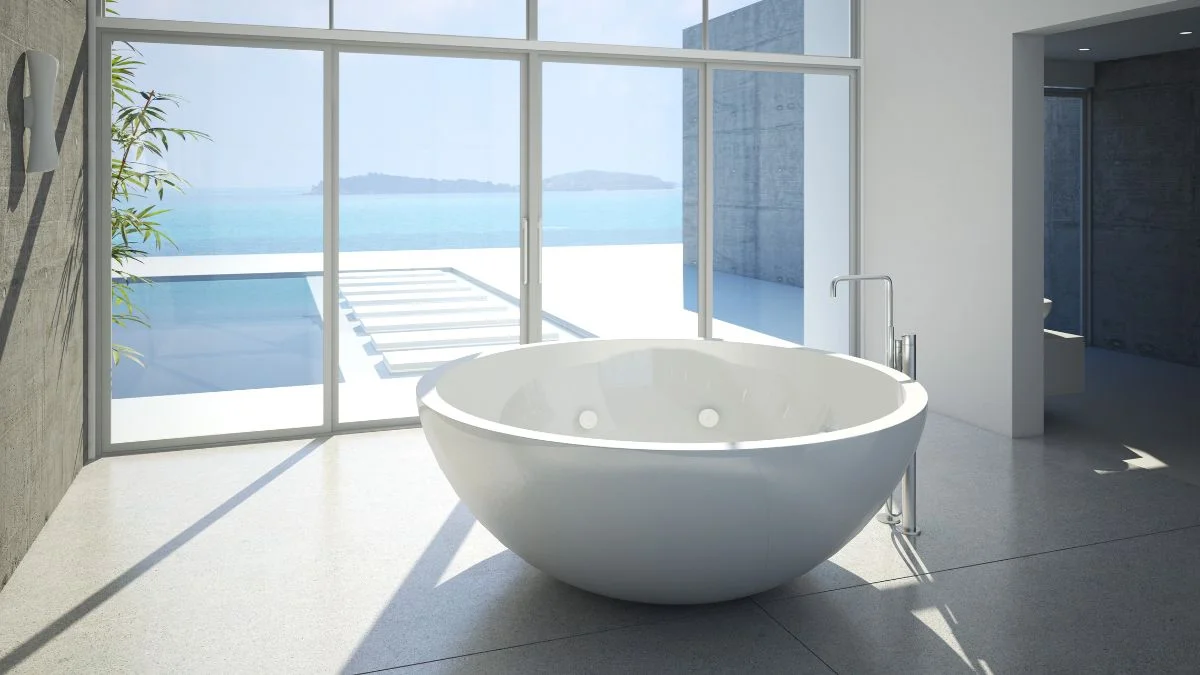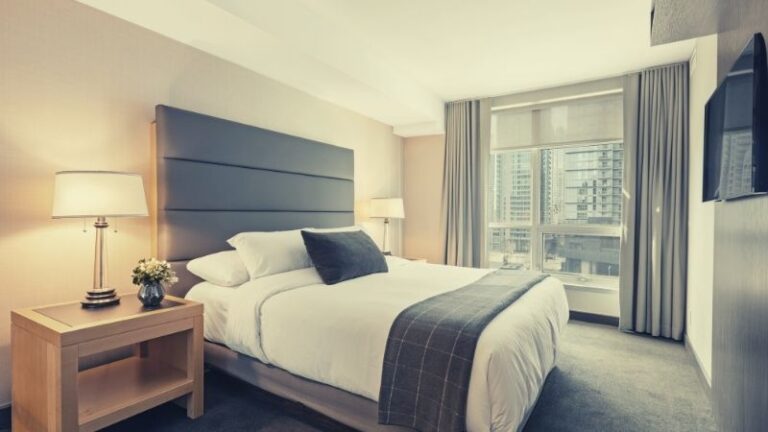What Is The Difference Between Ensuite And Private Bath In A Hotel?

As participants in Amazon Associates and other programs, we earn from qualifying purchases. This comes at no additional cost to you. For more details, see our Affiliate Disclosure.
When booking a hotel, the type of bathroom amenities offered can greatly influence a guest’s choice and overall experience. Two terms that often pop up in hotel listings are “ensuite” and “private bath.” But what do these terms mean, and how do they differ? This article delves into the nuances between an ensuite and a private bath in a hotel, ensuring you make an informed decision for your next stay.
HIGHLIGHTS:
- Ensuite bathrooms directly adjoin a hotel room, providing guests with immediate and private access, whereas private baths are designated for a particular room’s use but might not be directly connected.
- Both ensuite and private bathrooms cater to modern preferences for comfort and privacy, but the main difference lies in their accessibility, design, and the unique experiences they offer.
- Ensuite bathrooms are often seen as a premium feature in hotels, integrating seamlessly with the room and often equipped with modern amenities. Private baths, while separate, can offer unique designs, especially in historic or boutique hotels.
The Definition of Ensuite and Private Bath
In the world of hospitality, understanding the terminology can greatly influence your stay. Two terms that often puzzle guests when considering their accommodations are “ensuite” and “private bath.” Here’s what they mean:
Ensuite
An ensuite bathroom (often just referred to as an “ensuite”) directly adjoins a hotel room, providing the guest with private access. This means that the guest can access the bathroom directly from their room without having to step into a corridor or any other common area. It’s akin to having a personal bathroom right next to your bedroom at home.
Private Bath
A private bath is a bathroom that is designated for the exclusive use of a particular room or guest but may not be directly connected to the room. In some older hotels or in certain designs, you might have to leave your room and perhaps walk a short distance down the hall to access it. Though other guests won’t use this bathroom, the key difference from an ensuite is that you might need to exit your room to get to it.
Both bathroom types offer privacy, but their location and accessibility differ, which can affect the comfort and convenience of a guest’s stay.
Differences Between Ensuite And Private Bath In A Hotel
When choosing a hotel room, the kind of bathroom provided can be a pivotal point in the decision-making process. Both ensuite and private baths offer privacy, yet they cater to different preferences and needs. Let’s dissect the key differences between them:
Direct Accessibility
Ensuite: This type of bathroom is directly connected to your hotel room. There’s no need to step out into a hallway or common area. It provides the utmost convenience, especially for those nighttime visits.
Private Bath: While it’s dedicated for your use, you might need to exit your room to access it. This can be a bit inconvenient, especially if you’re in your pajamas or if you’ve forgotten something in your room.
Space and Layout
Ensuite: Given its direct connection to the room, the layout is often more integrated and may provide a more spacious feel.
Private Bath: Depending on the hotel’s design, these bathrooms might be larger or smaller. They might be detached due to architectural constraints or historical preservation reasons.
Security and Privacy
Ensuite: Being directly attached to your room, it offers maximum privacy. There’s no chance of running into someone in the hallway.
Private Bath: While it’s exclusively yours, there’s the potential for slight discomfort or security concerns, especially if it’s located further down a corridor.
Historical Significance
Ensuite: Modern hotels or renovated older ones usually have ensuite bathrooms, reflecting contemporary preferences.
Private Bath: Often found in older, historic hotels where original architecture didn’t accommodate direct bathroom access. Staying in such a room might offer a touch of historical charm.
Pricing
Ensuite: Rooms with ensuite bathrooms might be priced slightly higher due to the added convenience.
Private Bath: Given the minor inconvenience of a detached bathroom, these rooms might be priced a bit lower.
Guest Preferences
Ensuite: Ideal for those who value direct access, convenience, and modern design.
Private Bath: Suitable for guests who don’t mind a short walk, perhaps valuing the charm of a historic building or seeking a slightly cheaper rate.
While both ensuite and private bathrooms provide the privacy guests seek, the difference lies in their accessibility, design, and the unique experiences they offer.
Benefits of an Ensuite Bathroom
Having an ensuite bathroom, directly connected to your hotel room, brings with it a range of advantages that cater to various guest preferences and needs. Here are some prominent benefits:
- Convenience and Comfort: There’s nothing quite like the ease of walking a few steps from your bed to your bathroom without the need to venture into a hallway or a shared space. Especially for nighttime visits, the direct access is undeniably convenient.
- Enhanced Privacy: With an ensuite, there’s no chance of bumping into other guests. It offers an added layer of seclusion, especially for those who highly value privacy.
- Safety and Security: Without the need to leave your room, there’s less concern about forgetting to lock your room door or worrying about personal belongings. Everything remains within your personal space.
- Integrated Design: Hotels usually design ensuite bathrooms to complement the aesthetic and functionality of the main room. This results in a harmonious environment that can enhance the guest’s overall experience.
- Increased Flexibility: Whether you’re an early riser or someone who prefers nighttime showers, having direct access to your bathroom means you can use it anytime without the stress of possibly disturbing others.
- Perceived Luxury: The term ‘ensuite’ often carries a luxurious connotation. It’s seen as a premium feature, elevating the guest’s perception of their stay and the hotel’s offerings.
- Potential for Enhanced Amenities: Ensuite bathrooms might be equipped with superior features, such as jacuzzi tubs, high-end toiletries, or advanced shower systems, further enhancing the guest experience.
- Space Efficiency: With an adjoining bathroom, guests often feel they have more usable space, as there’s a seamless transition between the sleeping and bathing areas.
- Reduced Noise Disturbance: Without the need to open and close the main room door to access the bathroom, there’s less noise disturbance, ensuring a quieter and more peaceful stay.
Ensuite bathrooms cater to modern preferences for comfort, luxury, and privacy. They often play a significant role in ensuring guests have a memorable and enjoyable hotel experience.
Advantages of a Private Bath
While ensuite bathrooms offer their own set of advantages, private baths shouldn’t be overlooked. They come with their own unique benefits, especially depending on the hotel’s architecture, history, and design considerations. Here are some notable advantages:
- Exclusive Use: Just like an ensuite, a private bath guarantees exclusivity. Only you or those staying in your specific room have access, ensuring cleanliness and privacy.
- Potential for Larger Space: In some older hotels or architectural designs, private baths may actually be larger than ensuites because they were built outside the constraints of the room’s layout.
- Unique Design Features: Especially in historic or boutique hotels, private baths might showcase unique architectural or design elements, reflecting the building’s history or a particular theme.
- Cost Efficiency: Rooms with private baths, due to the minor inconvenience of a detached bathroom, might come at a slightly reduced rate, providing value for budget-conscious travelers who still want privacy.
- Reduced Humidity and Odors in the Room: Since the bathroom is separate, any humidity from showers or odors doesn’t directly permeate the main room, ensuring a fresher environment.
- Sense of Adventure: For some travelers, having a bathroom down the hall can be a charming quirk, adding to the uniqueness of their hotel experience.
- Less Noise Disturbance: There’s a reduced chance of hearing plumbing or bathroom-related noises from adjacent rooms, as private baths might be spaced out more than typical ensuite setups.
- Historical Authenticity: For history enthusiasts or those looking for an authentic experience, choosing a room with a private bath in a historic hotel can be a nostalgic journey, reminiscent of how travelers might have experienced the hotel in yesteryears.
- Preservation of Room Space: Without an integrated bathroom, the main room can sometimes be more spacious, offering guests more area to relax, work, or sleep.
While private baths might not be everyone’s first choice, they certainly cater to a niche of travelers who value a blend of privacy, historic charm, and unique experiences.
Considerations When Choosing Between Ensuite and Private Bath
Selecting the perfect accommodation hinges on understanding your preferences and what matters most to you during your stay. If you’re torn between choosing a room with an ensuite bathroom and one with a private bath, consider the following factors to make an informed decision:
Convenience: Do you value the ease of accessing your bathroom without stepping into a common area, especially during the night? If yes, ensuite might be preferable.
Budget: Rooms with private baths might sometimes be more budget-friendly than their ensuite counterparts. Determine how much you’re willing to spend and whether the bathroom setup justifies any price differences.
Historical Experience: If you’re staying in a historic or boutique hotel and want to immerse yourself in its authenticity, you might lean towards the charm of a private bath.
Duration of Stay: For short stays, the type of bathroom might not matter as much. However, for extended periods, the convenience of an ensuite could make a difference in overall comfort.
Security Concerns: If you’re someone who worries about security or the hassle of locking and unlocking your room frequently, an ensuite would eliminate such concerns.
Room Size and Layout: Sometimes, rooms with private baths offer more living space. If room size matters more to you than the bathroom’s direct accessibility, you might prioritize a private bath.
Aesthetic Preferences: Consider the design and ambiance of both room options. Sometimes, the unique design features of a private bath might be more appealing than a standard ensuite.
Travel Companions: If traveling with a partner or family, discuss their comfort levels. Some might not be keen on walking down a corridor during the night, especially with children.
Noise Sensitivity: If you’re sensitive to noises, remember that ensuites might occasionally let in sounds from adjacent bathrooms. A detached private bath might offer a quieter experience.
Personal Routine: Consider your routines and habits. If you enjoy long baths or showers without worrying about steaming up your room or prefer to keep bathroom-related activities entirely separate, a private bath might be appealing.
When choosing between an ensuite and private bath, it’s crucial to weigh these considerations and align them with your preferences. Remember that the perfect choice for one person might differ for another, so trust your instincts and prioritize what will make your stay the most enjoyable.
How Hotels Design and Market these Bathroom Types
The design and marketing of bathroom types in hotels is a strategic process, deeply rooted in understanding guest preferences and maximizing space and utility.
When it comes to ensuite bathrooms, hotels prioritize seamless integration with the room. This involves ensuring that the aesthetic of the bathroom complements the overall design of the room, creating a harmonious ambiance.
Modern amenities like rain showers, heated floors, or smart mirrors might be included to elevate the luxury feel. Given their direct access and perceived luxury, ensuites are often marketed as a premium feature.
Advertisements or listings might highlight the convenience and privacy they offer, positioning them as ideal for guests who value comfort and direct accessibility.
On the other hand, private baths might be designed keeping in mind the broader architecture of the hotel, especially in older or historic establishments.
Given their detachment from the main room, there’s often an opportunity to create a unique design, sometimes preserving historical elements or introducing thematic decor. In marketing private baths, hotels might emphasize their exclusivity.
They can also spotlight any distinctive design features or the charm and authenticity they bring to the guest experience, especially if the hotel has a rich history or a distinct theme.
Regardless of the type, the goal in both design and marketing is to enhance the guest experience, ensuring comfort, functionality, and a touch of luxury.






